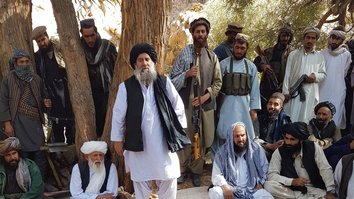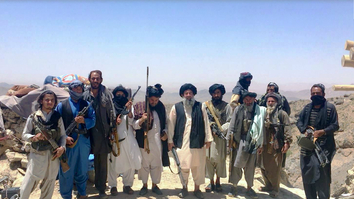HERAT -- Infighting among the Taliban has left dozens of fighters dead in Herat Province in the latest outbreak of violence between various factions.
Clashes broke out on Tuesday (August 6) between followers of Taliban leader Mullah Haibatullah Akhundzada and those of Mullah Muhammad Rasool, killing 34 fighters and wounding another 13.
More than 600 Taliban members from both sides have either been killed or wounded since infighting began in Herat more than three years ago, according to local officials.
A Taliban faction in Guzara District does not obey the Taliban leadership and even fights against it. The Taliban fighters from the main group attacked the faction, said Herat Governor Abdul Qayum Rahimi.
![A screenshot from a Salaam Times video shows Taliban fighters loyal to Mullah Manan Niazi, deputy commander of a Taliban splinter group, in an undisclosed location in Herat Province last year November 10. [File]](/cnmi_st/images/2019/08/08/19380-m_2-585_329.jpg)
A screenshot from a Salaam Times video shows Taliban fighters loyal to Mullah Manan Niazi, deputy commander of a Taliban splinter group, in an undisclosed location in Herat Province last year November 10. [File]
"The security forces are working on a plan to defeat the Taliban in the area, where they [the two Taliban factions] are engaged in [internal] fighting, and ensure security," Rahimi told reporters at a news conference on August 6. "The area will soon be cleared."
"Taliban fighters operate in some of the remote villages, and they disturb and harass local residents," he added. "We can no longer tolerate [unauthorised] gunmen, and we'll fight them."
The internal tensions within the Taliban emerged shortly after the death of Taliban founding leader Mullah Mohammad Omar was made public July 9, 2015, more than two years after he had actually died.
As a result, one Taliban faction comprised of thousands of militants led by Rasool split from the main Taliban group -- the Quetta Shura -- and declared itself an independent entity. The new group named itself "the High Council of Afghanistan Islamic Emirate".
Suitable opportunity to defeat the Taliban
The escalating clashes between Taliban factions create an opportunity for security forces to attack, say some analysts.
"Recent conflicts between the Taliban reveal that some of the Taliban want peace and try to distance themselves from the militant and violent branch of the group, but the irreconcilable fighters among the Taliban try to annihilate those members who want peace, and weaken the spirit of peace among the group," said Abdul Qader Kamel, a political affairs specialist in Herat Province.
The situation provides a golden opportunity for security forces to strike the Taliban members who do not want peace and to support those who do, he said.
"The Taliban's feuding has resulted in a decline in the attacks on government institutions and checkpoints, and they help reduce the number of military and civilian casualties," he added.
Severe rifts exist within the Taliban, said Sayed Ashraf Sadaat, a civil society activist in Herat Province. Political and military leaders of the Taliban do not co-ordinate with each other, and military commanders sometimes violate the orders of their leaders.
The more the Taliban turn on each other with discord and conflicts, the more their military and political position will decline, he said.
The Taliban claim that the group's members are united and operate in concert with each other, but fissures are apparent in the recent infighting in Herat Province, Sadaat said.
"Rifts among the Taliban did exist in the past, but they are now worsening day by day," said Jawad Ameed, a civil society activist in Herat Province. "They [the rifts] have now led to rifts that will further weaken the group."
"When the Taliban have internal rifts, their political position is severely affected," he added. "The Taliban no longer retain the power they had in the past, as some of their members are disobeying their leaders."

![A screenshot from a Salaam Times video shows Taliban fighters under Mullah Manan Niazi, deputy commander of a Taliban splinter group, in an undisclosed location in Herat Province on November 10, 2018. [File]](/cnmi_st/images/2019/08/08/19379-m_1-585_329.jpg)






